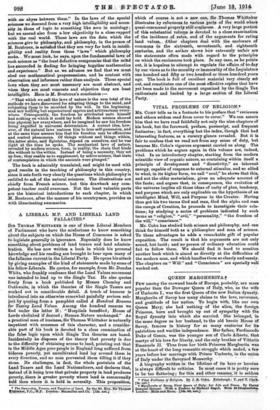A LIBERAL M.P. AND LIBERAL LAND FALLACIES.*
SIR Thomas WHITTAKER is one of those Liberal Members of Parliament who have the misfortune to know something about the subjects on which the House of Commons is asked to legislate generally in ignorance. Especially does be know something about problems of land tenure and land adminis- tration. He has now written a book in which his personal 'knowledge and his reading are brought to bear upon many of the fallacies current in the Liberal Party. He opens his attack by giving examples of the kind of statements made by some of his fellow-Liberals. He quotes, for example, from Mr. Dundee White, who frankly confesses that the Land Values movement was intended to lead up to the Single Tax. He also quotes freely from a book published by Messrs Chomley and Outhwaite, in which the theories of the Single Taxers are worked out in considerable detaiL A touch of humour is introduced into an otherwise somewhat painfully serious sub- ject by quoting from a pamphlet called A Hundred Reasons for Taxing Land Values. Among the hundred reasons we find under the letter H: "Hospitals benefited; House of Lords abolished if desired ; Human Nature unchanged." As a practical man of business, Sir Thomas Whittaker is naturally Impatient with nonsense of this character, and a consider- able part of his book is devoted to a close examination of the false logic upon which Single Tax theories are based. Incidentally be disposes of the theory that poverty is due to the difficulty of obtaining access to land, pointing out that In the Middle Ages poor people in England long suffered from hideous poverty, yet uncultivated land lay around them in every direction, and no man prevented them tilling it if they chose. He challenges, in filet, the whole postulate of the Land Taxers and the Land Nationalizers, and declares that, Instead of it being true that private property in laud produces poverty, there is greater poverty where land is communally bald than where it is held in severalty. This proposition.
• The Ownership, Tense's, and Taxation of Land. By the Rt. Hon. Sir Thomas thItteker, P.C., bl.?. t.oadOe: Macmillan and Oo. iLti, net.) which of coarse is not a new one, Sir Thomas Whittaker illustrates by references to various parte of the world where quasi-communal property still conthines. A very large portion of this substantial volume is devoted to a close examination of the incidence of rates, and of the arguments for rating land values. ;Other chapters deal with the enclosure of commons in the sixteenth, seventeenth, and eighteenth _centuries, and the author shows how extremely unfair are the statements often made with regard to the principles on which the enclosures took place. In any case, as he points out, it is hopeless to attempt to regulate the affairs of to-day by our views as to the morality or immorality of the Legislature one hundred and fifty or two hundred or three hundred yeara ago. The book is full of excellent material very clearly set out, and constitutes one of the most effective replies that have yet been made to the movement organized by the Single Tax enthusiasts and backed by a large section of the Liberal Party.










































 Previous page
Previous page